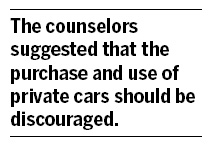Investment
Central government takes wider aim at congestion
By Wang Chao (China Daily)
Updated: 2010-11-08 10:48
 |
Large Medium Small |
BEIJING - Parking fees have been increased, license plate numbers determine when drivers can access their cars during the week, and purchase taxes for car buyers could be raised soon.
Still, traffic congestion in the nation's capital and other major cities is at such intolerable levels that the central and local governments are pushing to do even more to contain the excessive growth of private cars.
In a sign that the central government is taking city congestion seriously, counselors from the State Council were asked by the Beijing Transportation Research Center for their suggestions about China's transportation policy during the planning stages of the 12th Five-Year Plan (2011-2015). The hot topic of the day? Private car control.
The counselors suggested that the purchase and use of private cars should be discouraged. They also suggested that "congestion fees" should be levied on cars driving into the downtown areas of a city during rush hours; and more parking fees in downtown areas should be handed out.
The suggestions from the counselors are significant. Premier Wen Jiabao has invited the counselors to make suggestions and he will receive their proposals directly.
But much has already been done, at least by Beijing, to control congestion. Parking fees were raised in 13 areas of the capital on April 1. In Wangfujing, for instance, the fee was raised from 5 yuan (75 cents) to 10 yuan for the first hour of parking. A draft is pending on raising taxes on all modes of transport, with higher taxes for high-emission cars.

Although Beijing drivers are already restricted once a week from driving their cars according to the last digit on their license plates, road congestion hasn't cleared up. During rainy or foggy days when cars drive slower, more than 100 roads in Beijing are usually clogged.
Outside Beijing, local governments are working toward controlling the number of cars on the road. On Oct 27, East China's Jiangsu province said it is making policies like Beijing's to maintain a reasonable growth of private cars in cities. In Chengdu, the capital of Southwest China's Sichuan province, the local government is trying to contain the daily increase of private cars to 241.
There were about 4.6 million cars in Beijing and 76.2 million nationwide at the end of 2009. The number is expected to grow about 15 percent each year, according to the China Association of Automobile Manufacturers.
But a stronger will by the government to restrict cars is making some car manufacturers a bit uneasy.
"I'm a little worried about the policy," Wang Dazong, president of the Beijing Automobile Group Co Ltd (BAIC) told China Daily. "There might be fluctuations in our sales if a powerful restriction policy is issued."
Yan Jinghui, deputy general manager of Beijing Asian Games Village Automobile Exchange Market, the biggest automobile market in North China, said the restriction policy might just be temporary.
"It is not the industry that is to blame. There are only 4.5 million cars in Beijing, while in Tokyo, the number is 7 million, and in New York it is 10 million. Why is Beijing the most congested? The unscientific road designs and city planning are also responsible (for the traffic congestion)."
Car ownership ratio in China is 50 cars for every 1,000 people, far lower than the world average of 160 for every 1,000 people. In the United States, the number is 860 for every 1,000, according to the China Association of Automobile Manufacturers.
Despite the low ratio in China, congestion remains a massive problem. Many auto experts agreed with Yan and suggested a comprehensive plan to solve the congestion problem.
Jia Xinguang, an independent auto analyst, said the government should make multiple plans to direct car use.
"This year the automobile industry is expected to increase by 25 to 28 percent year-on-year; if harsh restriction is enacted, the whole industry will be hurt," he said.
Liu Qi, Beijing Party secretary, said governments should transform the idea of "transportation is building roads" to "transportation is sending people to their destinations". To achieve this goal, Beijing should build new financial and commercial areas to reduce traffic pressure in the central part of Beijing, which is saturated with businesses. If that happens, Liu said, the government will spend more on public transportation infrastructure.
China Daily